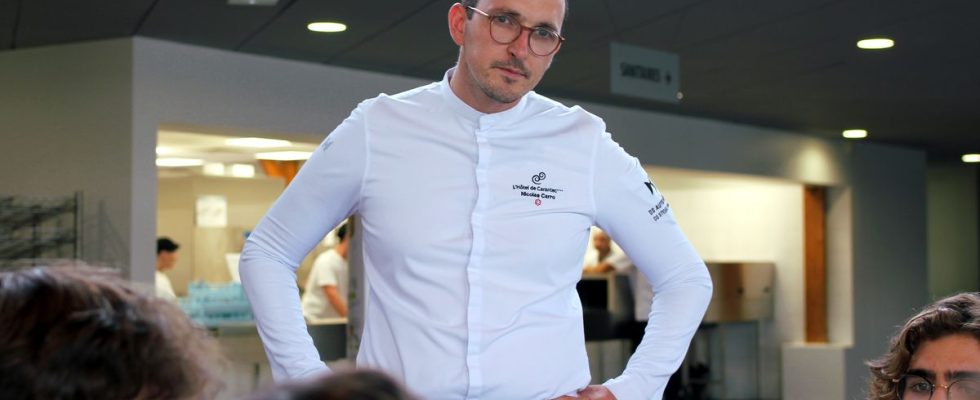It was a bit like the middle school Christmas dinner, except there was no chocolate papillote for dessert. Tuesday, September 19, the students who entered the doors of the Astrolabe on the Beaulieu campus, in Rennes, were treated to a somewhat special lunch concocted by chef Nicolas Carro. Owner of the Carantec hotel (Finistère) and proud holder of a star in the Michelin Guide, the 34-year-old chef worked with Crous Bretagne with the aim of offering a different menu, but respecting the financial constraints of the administration. On today’s menu: tangy breizh wrap, tabbouleh with Breton flavors, trout fillet and Jerusalem artichoke gratin or duo of lentils and wheat. For dessert ? An egg cream “like a childhood memory” or a soft chocolate cake. For a month, he will leave the kitchen of his seaside restaurant from time to time to try his hand at collective catering.
Accustomed to going to primary schools to provide taste education, Nicolas Carro wanted this time to send a message to students, encouraging them to eat well. At the end of an interminable service which saw 2,000 students pass through, the chef agreed to look at the delicate question of feeding the younger generations, faced with galloping inflation which is squandering their meager savings. A juicy exchange.
You have just completed your shift in the Crous kitchens. What struck you the most?
Not seeing the light during service. I started here at 6:30 a.m. whereas in my restaurant, we don’t arrive before 9 a.m. When we launched the service, I had the impression of not seeing the end of it, of having a continuous flow. At one point, I looked up and was told that we had reached 500 people and that there were still 1,500 more to arrive. At home, I have 55 place settings per service and 15 cooks to prepare them. Here, there were barely ten of us to bring out 2,000 meals. You quickly see the difference. I saw the staff cooking 200 kg of rice. I don’t know how to do that.
Did you only draw from the Crous catalog?
Yes and we respected the cost of the meal, we definitely didn’t want to exceed it. We haven’t changed the habits of the U restaurant. I just asked for trout. We succeeded with a local producer. I wanted to introduce this fish. I didn’t want salmon, I wanted an animal that had been fed with respect for well-being and that hadn’t been stuffed with animal meal.
What message did you want to convey to students by coming here?
I have had many student friends who sacrificed a meal because they didn’t have time or because it was too expensive. Some people tell themselves that when they skip a meal, they will save money. It’s wrong. I always say: an empty bag doesn’t hold up. When we eat poorly, we are immediately tired, we don’t feel well. I think that to study you need to be in good shape. Some people don’t agree to have breakfast and I can hear it. But lunch and dinner meals are essential for me. By coming to Crous, I wanted to tell the students to let themselves go, to try things while giving them variety. This afternoon, we tried a Jerusalem artichoke puree. And it worked.
But there is an economic reality that often catches up with students…
I hear it. Sometimes we say to ourselves that eating cheap means eating pasta every day. This is not reality. To eat inexpensively, students can try batch cooking. It involves cooking once and for all on Sunday to have all my menus for the week. This allows you to optimize foods and eat healthy.

Sometimes we indulge in a pasta box and tell ourselves we don’t have time. I have nothing against it but it’s extremely expensive. We often think that going to the market will cost us more than going to discount stores. With covid, we saw lots of people going to farms but that got a little lost. Yes, there are unreasonable prices but we can optimize if we start cooking, even simple things.
The student years are sometimes the scene of questionable culinary habits. What is your guilty pleasure?
I would say the croque-monsieur. It’s simple, effective. Bread, butter, cheese, ham, béchamel. That’s the real pleasure. And then it’s not because I’m a starred chef that I eat star-studded meals every day. What I call on here and everywhere is to keep things simple, to have fun. Yes, I sometimes eat reheated snacks. There are times when I don’t feel like cooking so I indulge. Yes, my son eats crab sticks and so do I. You simply have to let yourself live. It’s important to eat well but sometimes you have to know how to keep things simple.
Minister Olivia Grégoire raised the possibility to introduce cooking classes at school to cope with inflation. What do you think of this possibility?
Getting back into cooking is essential. Because we will force ourselves to eat differently, we will try to vary, to sometimes eat vegetarian. When I started cooking, I only knew how to make apple pie, and then that. Even today, I have lots of friends who tell me that they only know how to cook pasta. There is a form of education to be found. In my restaurant, for example, there are never fries on the children’s menu. I sometimes have a few scandals with parents but for me, balance comes from that. I’m a parent too and if my son had the choice, he would eat pasta sausages every day and he would be happy. But it is our role to bring them the taste, to introduce them to the products. In primary schools, children are very attentive. The earlier we start, the more we will make them want to try.

